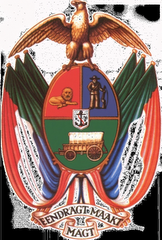http://www.iol.co.za/index.php?set_id=1&click_id=13&art_id=vn20070826091039682C631913
Christelle Terreblanche
August 26 2007 at 09:37AM
A year before he became president, Thabo Mbeki told parliament in 1998 that South Africa faced the challenge of "allowing a thousand flowers to bloom".Quoting the Chinese slogan from the Mao years - "Let a hundred flowers bloom! Let a hundred schools of thought contend!" - Mbeki said that the need was underpinned by the complexity of issues facing the country."Let none of us pretend that the debate about change will be capable of being handled in the manner of a cozy chat around a bountiful dinner table. Because of the nature of what we have to do, it will be rough and painful and drive many of us to shout at one another, to curse and use misunderstood and hurtful words that were only meant to soothe, if only they were understood," he said.
Nine years later and with only 18 months of the Mbeki presidency remaining, those words ring both prophetic and futile. Many a harsh word has been spoken and many who have criticised his presidency believe that the thousand flowers are being crushed, just as they were in Mao's regime. Those who knew the jovial and generous Mbeki who returned from exile in the early 1990s have been shocked by the vindictive and authoritarian tone of his attacks during the past month over the Frere Hospital saga. The maliciousness has been directed particularly at Nozizwe Madlala-Routledge, his axed deputy health minister, who described the baby deaths at Frere a "national emergency" - seen in the context of the country's declining human development index (HDI), a measure of poverty and life expectancy. The government has consistently denied the United Nation's HDI for the country. Mbeki in 2006 called its calculations that poverty had deepened "obviously wrong" and "illogical".Referring to Frere, he said that the "mini-skirt" data on baby deaths were wrong and the truth misconstrued - intensifying a perception of a president in an ivory tower of denial. Madlala-Routledge was called a "lone ranger" acting outside the "collective" for putting the spotlight on a systemic problem. This has raised questions over what Mbeki really sees as "the collective" and whether party interests and allegiances have superseded government accountability. There are signs that he will leave a legacy of rampant state corruption. Civil society and the media bit back harshly, something that probably took Mbeki by surprise. The attacks from both sides have become increasingly personal and demeaning, notably the media expose of health minister Manto Tshabalala-Msimang's alleged thieving and drinking. Some have called the public outcry a "seismic shift" in the nation's body politic.More serious are fears that the hardline tone is fuelling a climate of fear, loathing and repression and will mark Mbeki's last months as hegemony by stealth. There are signs that the ugly saga is developing into a full-blown crisis as the acrimonious succession battle approaches a climax at the ANC's national congress in December. What has happened to the man who wanted a thousand flowers to bloom? Is he already a lame duck, unable to exert his authority? Is the authoritarian tone a sign that his administration's legitimacy and hegemony are already disintegrating? Or is the realisation dawning that his legacy will be one of denial - over Aids, Zimbabwe, poverty and unemployment? Most commentators believe that Mbeki has become increasingly intolerant of criticism and incapable of self-criticism.A former member of his government remarked this week on the contradictions that mark a brilliant man who increasingly relies on struggle rhetoric to win the perception war and now won't allow anyone to contradict his "collective". Helen Zille, the opposition leader, ascribes Mbeki's attack on Madlala-Routledge as evidence that, in Mbeki's ANC, the leadership is increasingly acting as the "vanguard", "endowed with special insights to determine what is right for everyone else". Adam Habib, a political analyst, says, like most of his peers, that the president's over-reaction to Madlala-Routledge was not warranted. "The central need at this historical juncture is for a plurality of different views to exist in the centralised apparatus It is absolutely crucial that they are canvassed. If we don't we are in trouble at a later stage."Another commentator quotes Antonio Gramsci, the Italian strategist: "The old is dying and the new cannot be born; in this interregnum there arises a great diversity of morbid symptoms". These words are often used in the context of an incomplete democracy or a country at a crossroads.The "morbid" atmosphere revealed by the health "wars" can also be attributed to the past two years of succession battles - the more aggressive tone from Cosatu and the South African Communist Party, Jacob Zuma's mobilisation for the ANC presidency, and the "succession" coalitions forming behind the scenes.Those who fell foul of Mbeki in his earlier years, particularly over his macro-economic austerity programme, Gear, insist that the vicious tenor he has adopted in the health wars is not an aberration. They claim a long history of Mbeki acting in intemperate ways against those who contradict him, labelling them and hanging them out to dry.Then there are those in the Zuma camp who, for years, have accused him of using his increasingly centralised state power for witch-hunts among his detractors. Some of the acrimony has been a long time in the making. More recently it has unleashed the type of anger that saw a nearly month-long public-service wage strike across traditional race and class lines, and a spate of protests has been blazing across the country over perceived local government corruption and non-delivery. HIV and Aids, which claims 900 lives a day, and the government's perceived luke-warm response to it, has become a critical issue, according to which many in politics define themselves.It was precisely the president's lack of recognition of the graveness of the arms-deal allegations and his failure to act decisively that brought on the ugly succession battle - the single biggest dividing line in the tripartite alliance - fuelled by his axing of Zuma over allegations of arms-deal corruption.Mbeki has said he will stand for a third term as party president despite the fact that this has divided his party. This split is likely to deepen should Mbeki carry out his veiled threat to pursue a disciplinary agenda against Madlala-Routledge in the ANC. Now the stand-off over the health ministry is likely to exacerbate this divide and provide yet another platform for the alliance partners and Zuma to mobilise as the leadership battle heats up in advance of the conference. But Mbeki's most urgent dilemma is whether to act on the allegations already in the public domain against the health minister. He has never acted on the basis of media allegations but, uncharacteristically, he has promised to do so now if proof is provided. If he does not act, Mbeki runs the risk of his hurtful words having been "misunderstood", as he himself warned nine years ago. Worse, he might find himself hoisted with his own petard, becoming the victim his own vicious attempts to stave off his critics.
Sunday, August 26, 2007
Subscribe to:
Post Comments (Atom)







No comments:
Post a Comment